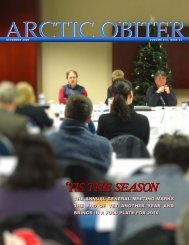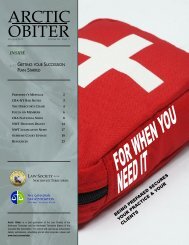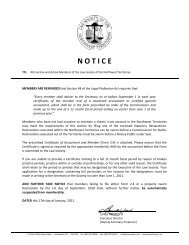INSTRUCTIONS TO ACCOUNTANTS FOR COMPLETION OF FORM 2.4
instructions to accountants for completion of form 2.4
instructions to accountants for completion of form 2.4
Create successful ePaper yourself
Turn your PDF publications into a flip-book with our unique Google optimized e-Paper software.
MEMORANDUM<br />
<strong>INSTRUCTIONS</strong> <strong>TO</strong> <strong>ACCOUNTANTS</strong><br />
<strong>FOR</strong> <strong>COMPLETION</strong> <strong>OF</strong> <strong>FOR</strong>M <strong>2.4</strong><br />
INTRODUCTION<br />
Form <strong>2.4</strong> is the means by which the Law Society may determine whether or not in your professional opinion:<br />
1. the law practice has the books of account required to be maintained by Part V of the Rules of the Law<br />
Society ("the Rules");<br />
2. the law practice has recorded financial transactions in accordance with Part V of the Rules of the Law<br />
Society ("the Rules");<br />
3. the accounting system in place appears adequate and to be working properly; and<br />
4. there were any contraventions of Part V of the Rules which came to your attention.<br />
The review required to complete the Form <strong>2.4</strong> will not be entirely the same as you would carry out if you were to<br />
express an opinion on the law practice's financial statements, and accordingly the minimum standards of review<br />
are shown under Part III of these Instructions.<br />
You may be asked to perform duties in addition to completing the Form <strong>2.4</strong>, such as bookkeeping services, audited<br />
financial statement preparation, systems evaluation, and assistance on income tax matters. These other services<br />
are not part of what is required for Form <strong>2.4</strong> purposes.<br />
<strong>FOR</strong>M <strong>2.4</strong><br />
The original Form <strong>2.4</strong> supplied by the Law Society must be used. A copy is not acceptable. If the space is<br />
insufficient, reference on it should be made to accompanying remarks submitted on your letterhead and signed by<br />
you.<br />
Your attention is directed to Part V of the Rules, and to Part VI of the Legal Profession Act, which are reproduced<br />
following these instructions.<br />
ENGAGEMENT PLANNING<br />
Some required test procedures in the following instructions relate to a selected test month. You should scan<br />
monthly trust reconciliations and select a test month representative of the law firm's trust transactions. The only<br />
P.O. Box 1298, Station Main ∙ Yellowknife, NT ∙ X1A 2N9 ∙ Tel: (867) 873‐3828 ∙ Fax: (867) 873‐6344 ∙ info@lawsociety.nt.ca ∙ www.lawsociety.nt.ca
THE LAW SOCIETY <strong>OF</strong> THE NORTHWEST TERRI<strong>TO</strong>RIES<br />
MEMO: Page 2 of 7<br />
restriction of the test month is that it cannot be the same month selected in the prior year or a month where no<br />
transactions occurred.<br />
The sample size required for testing has been determined to be 5 transactions per lawyer to a maximum of 15<br />
transactions per firm. Many other procedures apply to the entire period, such as review of trust reconciliations and<br />
trust bank statements.<br />
MINIMUM STANDARDS<br />
The scope of your review made with respect to the reporting period will depend upon your professional<br />
judgement, but must include at least the following:<br />
1. Read all of these Instructions, Part V of the Rules and Part VI of the Legal Profession Act reproduced<br />
following these instructions.<br />
2. Obtain the Member's Form <strong>2.4</strong> with Part A thereof duly completed and signed, and retain a copy in your<br />
files.<br />
3. Note at the start of your Form <strong>2.4</strong> engagement the dates to which the trust and non‐trust books and<br />
accounts were written up and posted.<br />
4. With reference to Rules 81 to 81.3, review the adequacy of the accounting system for trust and non‐trust<br />
transactions noting any exceptions to the checklist provided below. Enquire about and review any<br />
modifications pursuant to Rule 81 and examine the Member's copy of the Law Society's letter of<br />
authorization.<br />
A member's books of account must be maintained in<br />
a. legibly handwritten form, in ink or other duplicated or permanent form; YES NO <br />
b. printed form; or YES NO <br />
c. an electronic form that can readily be transferred to printed form on<br />
demand.<br />
YES NO <br />
The transactions recorded in a member's books of account must be in chronological<br />
order and in a form that is easily traceable.<br />
YES NO <br />
A member shall maintain at least the following trust books of account:<br />
a. a trust cash book or synoptic showing,<br />
i. for all trust money received for each client, the date of receipt, the<br />
source of the money and the identity of the client on whose behalf the<br />
trust money is received,<br />
ii. for all money disbursed out of trust for each client, the cheque or<br />
voucher number, the date of each disbursement, the name of each<br />
recipient and the identity of the client on whose behalf the trust<br />
money is disbursed;<br />
YES NO <br />
YES NO <br />
4th Floor, Diamond Plaza ∙ 5204 – 50 th Avenue ∙ P.O. Box 1298 ∙ Yellowknife, NT ∙ X1A 1E2 ∙ Tel: (867) 873‐3828 ∙ Fax: (867) 873‐6344 ∙ info@lawsociety.nt.ca ∙ www.lawsociety.nt.ca
THE LAW SOCIETY <strong>OF</strong> THE NORTHWEST TERRI<strong>TO</strong>RIES<br />
MEMO: Page 3 of 7<br />
b. a trust ledger showing separately for each client on whose behalf trust<br />
money has been received, all such money received and disbursed and the<br />
unexpended balance;<br />
YES NO <br />
c. a record<br />
i. showing each transfer of money between clients' trust ledgers, YES NO <br />
ii. containing an explanation of the purpose for which each transfer is<br />
made, and<br />
YES NO <br />
iii. containing the member's written approval of the transfer; YES NO <br />
d. monthly trust reconciliations required to be prepared under Rule 81.7, and<br />
any detailed listings, documents, banking documents and vouchers<br />
prepared in support of the reconciliations;<br />
YES NO <br />
e. file copies of all billings for fees charged or other billings made to clients,<br />
which copies<br />
i. show the dates such charges are made, YES NO <br />
ii. identify the clients charged, and YES NO <br />
iii. are filed in chronological, alphabetical or numerical order; YES NO <br />
f. copies of bank validated duplicate deposit slips for all deposits made; YES NO <br />
g. all supporting vouchers and documents, including monthly bank<br />
statements, pass books, cancelled cheques, bank vouchers and similar<br />
documents and invoices.<br />
YES NO <br />
A member shall maintain, at a minimum, the following non‐trust books of account:<br />
a. a non‐trust cash book or synoptic showing,<br />
i. for all non‐trust money received relating to the law practice, the date<br />
of receipt and the source of the money, and<br />
YES NO <br />
ii. for all non‐trust money disbursed, the cheque or voucher number, the<br />
date of each disbursement and the name of each recipient;<br />
YES NO <br />
b. an accounts receivable ledger or other suitable system to record, for each<br />
client, the member/client position on all non‐trust transactions with<br />
respect to which a bill has been delivered or a disbursement made, and<br />
including:<br />
i. a record of all transfers from a trust account, YES NO <br />
ii. any other receipts from or on behalf of the client, and YES NO <br />
iii. the balance, if any, owed by the client; YES NO <br />
c. file copies of all billings for fees charged or other billings made to clients,<br />
which copies<br />
i. show the dates such charges are made, YES NO <br />
ii. identify the clients charged, and YES NO <br />
4th Floor, Diamond Plaza ∙ 5204 – 50 th Avenue ∙ P.O. Box 1298 ∙ Yellowknife, NT ∙ X1A 1E2 ∙ Tel: (867) 873‐3828 ∙ Fax: (867) 873‐6344 ∙ info@lawsociety.nt.ca ∙ www.lawsociety.nt.ca
THE LAW SOCIETY <strong>OF</strong> THE NORTHWEST TERRI<strong>TO</strong>RIES<br />
MEMO: Page 4 of 7<br />
iii. are filed in chronological, alphabetical or numerical order; YES NO <br />
d. copies of bank validated duplicate deposit slips for all deposits made; YES NO <br />
e. all supporting vouchers and documents, including monthly bank<br />
statements, pass books, cancelled cheques, bank vouchers and similar<br />
documents and invoices.<br />
The information required to be recorded on the accounts receivable ledger referred<br />
to in paragraph (1) (b) may be recorded on the trust ledger referred to in paragraph<br />
81.2(b) if the entries are clearly identified and are not combined with trust account<br />
information.<br />
YES NO <br />
YES NO <br />
5. With reference to Rule 81.4, test check that trust transactions have been recorded within 7 days after the<br />
transaction, noting any exceptions and the Member's explanation.<br />
6. In accordance with Rule 81.6, obtain Member's confirmation that the books of account of a member show<br />
current transactions and the transactions for six previous years as determined by the Member's fiscal year<br />
end.<br />
7. a. Review all trust reconciliations to ensure that the reconciliations are prepared monthly and that any<br />
differences between the totals are supported by the documentation outlined in Rule 81.7.<br />
b. Review all monthly bank account statements and pass book balances, noting any shortages in a<br />
clients' trust fund and ensuring that the shortage has been rectified within five days after coming to<br />
the Member's attention and where the shortage has not been rectified within five days, review the<br />
Member's written report of the facts and reasons as provided to the Law Society pursuant to Rule<br />
81.8 or 81.9.<br />
c. Review all monthly trust reconciliations, including those subsequent .to the reporting period, and<br />
compare gross trust liability with the total of the reconciled trust bank balances. Ensure that Section<br />
45 has been complied with. Refer to Part IV of these Instructions.<br />
d. With reference to Rule 81.5, test check that trust cash books have been added and balanced within<br />
the allotted time, noting any exceptions and the Member's explanation.<br />
8. Check in detail, one month's trust bank reconciliation(s).<br />
9. Check in detail, one monthly trust reconciliation.<br />
10. Obtain independent confirmation of the balance, as at the end of the reporting period, for each pooled<br />
and separate trust bank accounts or other depository in use at any time during the reporting period.<br />
Ensure that the confirmation agrees with the reconciliations prepared by the member at the end of the<br />
reporting period.<br />
4th Floor, Diamond Plaza ∙ 5204 – 50 th Avenue ∙ P.O. Box 1298 ∙ Yellowknife, NT ∙ X1A 1E2 ∙ Tel: (867) 873‐3828 ∙ Fax: (867) 873‐6344 ∙ info@lawsociety.nt.ca ∙ www.lawsociety.nt.ca
THE LAW SOCIETY <strong>OF</strong> THE NORTHWEST TERRI<strong>TO</strong>RIES<br />
MEMO: Page 5 of 7<br />
11. a. Test check receipts with deposit book and bank statements to ensure that trust money is deposited<br />
into a client's trust account within 7 days noting any exceptions and obtaining the Member's<br />
explanation.<br />
b. For the same sample in 11.(a), test check that the Member has paid into the client's trust account<br />
only that part representing trust money.<br />
c. Verify that trust money received by a resident member is deposited into a client's trust account in the<br />
Territories.<br />
12. a. Test check that trust money has been withdrawn in accordance with Rules 85 to 90.<br />
b. With reference to Rule 90, confirm that payments made out of the clients' trust account are made<br />
only by cheque bearing the signature or countersignature of the member or of another member<br />
designated as a signing authority.<br />
c. For the sample in 12.(a), ensure that all transactions tested were recorded within 7 days noting any<br />
exceptions and obtaining the Member's explanation.<br />
13. As provided for in Rule 89, examine any deposits made in compliance with subsection 57(4) of the Act<br />
pursuant to an arrangement made between the Member and a client where trust money has been<br />
deposited in a separate interest bearing account to ensure that the interest earned has been paid in<br />
accordance with the arrangement.<br />
COMMON REPORTING DEFICIENCIES<br />
The following is a brief description of some areas of concern.<br />
1. TRUST RECONCILIATIONS:<br />
The Rules require the Member to prepare monthly trust reconciliations. A trust reconciliation is, in its<br />
simplest form, a comparison between the trust assets (trust bank reconciliations and client separate<br />
interest bearing accounts) and the trust liabilities (detailed listing of the trust ledger accounts/cards). This<br />
reconciliation must be signed and dated by the member within 30 days of the month‐end. The<br />
reconciliation is the most fundamental control required by a Member.<br />
Recurring Problems:<br />
a. Exclusion of trust funds from the reconciliation.<br />
Exclusion of separate interest‐bearing accounts from the reconciliation constitutes a Breach of the<br />
Rules. Separate interest‐bearing accounts are client funds under the Member's control and must be<br />
included.<br />
b. Exclusions of inactive trust bank accounts from the reconciliation.<br />
Reconciliations must be completed for all operating trust bank accounts regardless of the activity<br />
level and closing balance. This means that inactive trust bank accounts must be reconciled even if the<br />
financial institution does not issue bank statements on a regular basis.<br />
4th Floor, Diamond Plaza ∙ 5204 – 50 th Avenue ∙ P.O. Box 1298 ∙ Yellowknife, NT ∙ X1A 1E2 ∙ Tel: (867) 873‐3828 ∙ Fax: (867) 873‐6344 ∙ info@lawsociety.nt.ca ∙ www.lawsociety.nt.ca
THE LAW SOCIETY <strong>OF</strong> THE NORTHWEST TERRI<strong>TO</strong>RIES<br />
MEMO: Page 6 of 7<br />
c. Differences not identified or explained.<br />
All differences between the trust listing and the bank reconciliations must be identified and<br />
explained. The Form <strong>2.4</strong> must disclose any differences not explained by the Member regardless of the<br />
amount. The accountant must exercise judgement in evaluating the explanation provided for any<br />
differences.<br />
d. Debit balances.<br />
All debit balances appearing on any month end trust listing must be reported. Debit balances are<br />
amounts overdrawn to the credit of a client. The Law Society does not consider it appropriate to net a<br />
deficiency on one trust ledger card against funds held by the same client on other ledger card( s).<br />
there may be a restriction on the trust funds as to usage and cannot be applied against the debit<br />
balance. The objective of the reconciliation is to match trust assets with trust liabilities. The presence<br />
of a debit balance may signify that liabilities exceed available assets.<br />
e. Interest on separate interest‐bearing accounts.<br />
Interest on these investments must be posted to the trust ledger account in either the month the<br />
interest was received or at the latest, by the end of the following month. Interest is not posted on the<br />
accrual basis; it is posted when received (cash basis). For example, the trust ledger account on a daily<br />
interest savings account would be posted monthly, while a six month GIC would be posted once the<br />
investment matured.<br />
f. Reconciling items.<br />
Outstanding deposits and cheques frequently clear in the next month. However, there may be staledated<br />
cheques. The number and dollar amount of the stale‐dated cheques should be noted on the<br />
Form <strong>2.4</strong>. Recurring reconciling items, especially those increasing the bank balance should be<br />
carefully scrutinized as they may indicate errors within the accounting records. Examples may include<br />
bank service charges and cheques not allocated against a client trust ledger account.<br />
2. BANK STATEMENT REVIEW:<br />
All trust bank statements for the Form <strong>2.4</strong> reporting period must be reviewed for overdrafts and for the<br />
Member's trust cheques issued that went NSF. These cheques are often difficult to identify as many banks<br />
do not record them on the bank statements but rather include a debit memo with the cancelled cheques.<br />
The NSF cheques do not refer to client cheques deposited into trust by the Member that are subsequently<br />
reversed by the financial institution.<br />
Recurring Problem:<br />
a. Bank or clerical errors resulting in an overdraft.<br />
Only those overdrafts which have not been rectified within five (5) days in accordance with Rule 81.8,<br />
need be reported. If there are numerous minor exceptions of a similar nature, report only on the<br />
general situation. Please note that if the bank statement has a running balance after each<br />
transaction, only the balance at the end of the day needs to be reviewed.<br />
3. TRUST LEDGER ACCOUNTS:<br />
The level of testing trust ledger accounts is set out above under Engagement Planning. Testing from the<br />
4th Floor, Diamond Plaza ∙ 5204 – 50 th Avenue ∙ P.O. Box 1298 ∙ Yellowknife, NT ∙ X1A 1E2 ∙ Tel: (867) 873‐3828 ∙ Fax: (867) 873‐6344 ∙ info@lawsociety.nt.ca ∙ www.lawsociety.nt.ca
THE LAW SOCIETY <strong>OF</strong> THE NORTHWEST TERRI<strong>TO</strong>RIES<br />
MEMO: Page 7 of 7<br />
trust ledger account to the monthly trust listing consists of a minimum sample of 5 per Member and a<br />
maximum sample of 15 per Firm. Testing in the other direction for unrecorded transactions, that is the<br />
trust ledger card to the trust listing, also consists of a minimum sample of 5 per member and a maximum<br />
sample of 15 per Firm. The level of testing applies equally to manual and computerized systems.<br />
Recurring Problems:<br />
a. Insufficient testing when the trust listing is smaller than the sample size.<br />
A Member may have 5 or less clients on the trust listing. This reduces testing in one direction but<br />
does not eliminate testing using the trust ledger accounts as the source. If you are unable to meet the<br />
minimum testing requirements, an explanation must be provided.<br />
b. Insufficient testing of computerized accounting systems.<br />
If the trust listing report is generated from the same system as the trust ledger accounts, you are still<br />
required to complete all testing as entries can be backdated or revised after the trust listing report<br />
has been generated.<br />
4. FINANCIAL RECORDS:<br />
Rules 81.2 and 81.3 outline which financial records, both trust and non‐trust, that the Members is<br />
required to maintain.<br />
Recurring Problems:<br />
a. Trust transfer journal not maintained.<br />
It is not sufficient for the Member to merely record transfers on the appropriate trust ledger<br />
accounts. A separate trust transfer journal must also be maintained. The journal can take on many<br />
forms. Photocopies of trust ledger accounts involved or memos from the Member requesting the<br />
transfers are acceptable, provided the documentation is contained in one file folder.<br />
CONCLUSION<br />
The concept of materiality, fundamental to so many other engagements, needs to be put aside as no client money<br />
can be regarded as immaterial. In addition, you need to have a sound understanding and clear appreciation for the<br />
Rules regarding trust money.<br />
The Law Society welcomes active discussion between the Member and yourself and encourages you to include an<br />
educational component for the Member in the scope of your review.<br />
Since the Form <strong>2.4</strong> and your explanatory letter, if any, are delivered to the Law Society by the Member, their<br />
contents will be known to the Member. It is expected, of course, that any differences of opinion will have been<br />
discussed and, where possible, resolved prior to completing Part B of Form <strong>2.4</strong>. Where differences of opinion exist,<br />
the Member has the option of writing a letter to the Law Society on the subject.<br />
4th Floor, Diamond Plaza ∙ 5204 – 50 th Avenue ∙ P.O. Box 1298 ∙ Yellowknife, NT ∙ X1A 1E2 ∙ Tel: (867) 873‐3828 ∙ Fax: (867) 873‐6344 ∙ info@lawsociety.nt.ca ∙ www.lawsociety.nt.ca
















